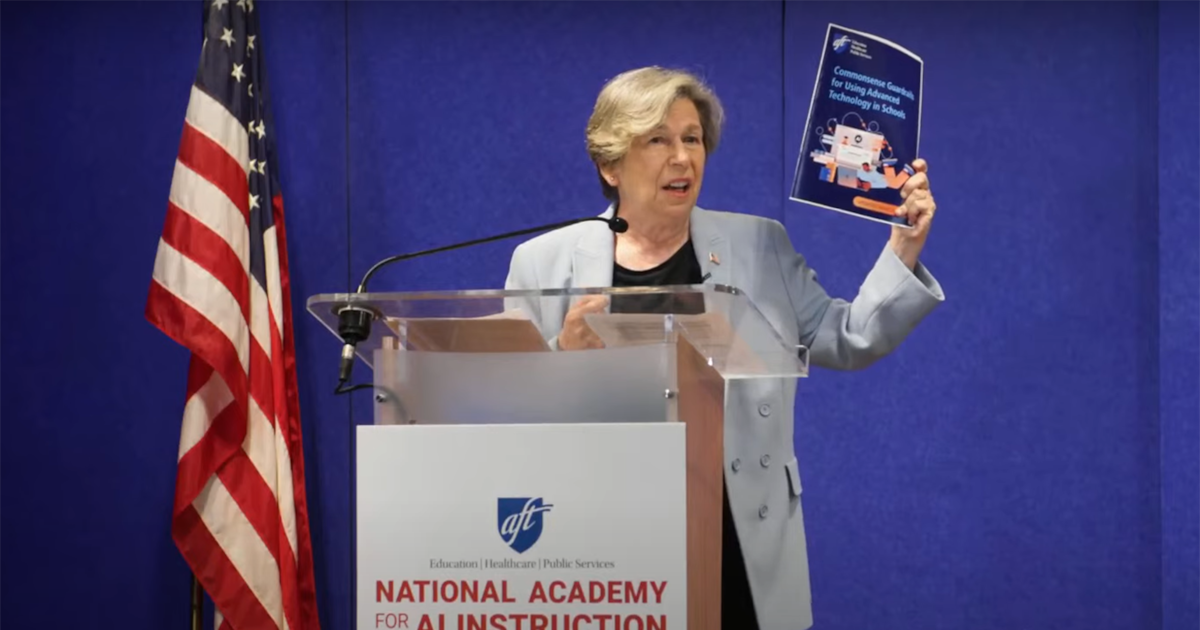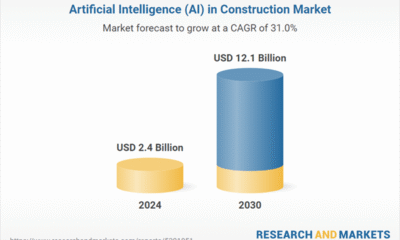Tools & Platforms
Expanded AI training for teachers, funded by OpenAI and Microsoft

Sign up for Chalkbeat’s free weekly newsletter to keep up with how education is changing across the U.S.
More than 400,000 K-12 educators across the country will get free training in AI through a $23 million partnership between a major teachers union and leading tech companies that is designed to close gaps in the use of technology and provide a national model for AI-integrated curriculum.
The new National Academy for AI Instruction will be based in the downtown Manhattan headquarters of the United Federation of Teachers, the New York City affiliate of the American Federation of Teachers, and provide workshops, online courses, and hands-on training sessions. This hub-based model of teacher training was inspired by work of unions like the United Brotherhood of Carpenters that have created similar training centers with industry partners, according to AFT President Randi Weingarten.
“Teachers are facing huge challenges, which include navigating AI wisely, ethically and safely,” Weingarten said at a press conference Tuesday announcing the initiative. “The question was whether we would be chasing it or whether we would be trying to harness it.”
The initiative involves the AFT, UFT, OpenAI, Microsoft, and Anthropic.
The Trump administration has encouraged AI integration in the classroom. More than 50 companies have signed onto a White House pledge to provide grants, education materials, and technology to invest in AI education.
In the wake of federal funding cuts to public education and the impact of Trump’s sweeping tax and policy bill on schools, Weingarten sees this partnership with private tech companies as a crucial investment in teacher preparation.
“We are actually ensuring that kids have, that teachers have, what they need to deal with the economy of today and tomorrow,” Weingarten said.
The academy will be based in a city where the school system initially banned the use of AI in the classroom, claiming it would interfere with the development of critical thinking skills. A few months later, then-New York City schools Chancellor David Banks did an about-face, pledging to help schools smartly incorporate the technology. He said New York City schools would embrace the potential of AI to drive individualized learning. But concrete plans have been limited.
The AFT, meanwhile, has tried to position itself as a leader in the field. Last year, the union released its own guidelines for AI use in the classroom and funded pilot programs around the country.
Vincent Plato, New York City Public Schools K-8 educator and UFT Teacher Center director, said the advent of AI reminds him of when teachers first started using word processors.
“We are watching educators transform the way people use technology for work in real time, but with AI it’s on another unbelievable level because it’s just so much more powerful,” he said in a press release announcing the new partnership. “It can be a thought partner when they’re working by themselves, whether that’s late-night lesson planning, looking at student data or filing any types of reports — a tool that’s going to be transformative for teachers and students alike.”
Teachers who frequently use AI tools report saving 5.9 hours a week, according to a national survey conducted by the Walton Family Foundation in cooperation with Gallup. These tools are most likely to be used to support instructional planning, such as creating worksheets or modifying material to meet students’ needs. Half of the teachers surveyed stated that they believe AI will reduce teacher workloads.
“Teachers are not only gaining back valuable time, they are also reporting that AI is helping to strengthen the quality of their work,” Stephanie Marken, senior partner for U.S. research at Gallup, said in a press release. “However, a clear gap in AI adoption remains. Schools need to provide the tools, training, and support to make effective AI use possible for every teacher.”
While nearly half of school districts surveyed by the research corporation RAND have reported training teachers in utilizing AI-powered tools by fall 2024, high-poverty districts are still lagging behind their low poverty counterparts. District leaders across the nation report a scarcity of external experts and resources to provide quality AI training to teachers.
OpenAI, a founding partner of the National Academy for AI Instruction, will contribute $10 million over the next five years. The tech company will provide educators and course developers with technical support to integrate AI into classrooms as well as software applications to build custom, classroom-specific tools.
Tech companies would benefit from this partnership by “co-creating” and improving their products based on feedback and insights from educators, said Gerry Petrella, Microsoft general manager, U.S. public policy, who hopes the initiative will align the needs of educators with the work of developers.
In a sense, the teachers are training AI products just as much as they are being trained, according to Kathleen Day, a lecturer at Johns Hopkins Carey Business School. Day emphasized that through this partnership, AI companies would gain access to constant input from educators so they could continually strengthen their models and products.
“Who’s training who?” Day said. “They’re basically saying, we’ll show you how this technology works, and you tell us how you would use it. When you tell us how you would use it, that is a wealth of information.”
Many educators and policymakers are also concerned that introducing AI into the classroom could endanger student data and privacy. Racial bias in grading could also be reinforced by AI programs, according to research by The Learning Agency.
Additionally, Trevor Griffey, a lecturer in labor studies at the University of California Los Angeles, warned the New York Times that tech firms could use these deals to market AI tools to students and expand their customer base.
This initiative to expand AI access and training for educators was likened to New Deal efforts in the 1930s to expand equal access to electricity by Chris Lehane, OpenAI’s chief global affairs officer. By working with teachers and expanding AI training, Lehane hopes the initiative will “democratize” access to AI.
“There’s no better place to do that work than in the classroom,” he said at the Tuesday press conference.
Chalkbeat New York bureau chief Amy Zimmer contributed to this report.
Norah Rami is a Dow Jones education reporting intern on Chalkbeat’s national desk. Reach Norah at nrami@chalkbeat.org.
Tools & Platforms
AI requires compassion, not just speed, historian warns

“Measure our progress not by the speed of our technology, but by the strength of our cooperation and by the depth of our compassion.”
With these words, historian Yuval Noah Harari addressed attendees at the 2025 Inclusion Conference on the Bund in Shanghai on Sept 11, urging a shift in focus from technological advancement alone to prioritizing human connection and ethical considerations in the age of artificial intelligence.
Harari, author of the Sapiens series, opened his speech with a vivid depiction of an ordinary morning in 2025, highlighting the pervasive influence of AI systems on daily life, from managing electricity grids and rerouting public transportation to making critical decisions in finance, energy, and even military operations.
The historian acknowledged technology has brought undeniable benefits, including advancements in health, knowledge, and connectivity.
However, Harari expressed concern about the rapid pace and method of technological change, warning that the true danger lies not in a “robot rebellion”, but in a more subtle and insidious shift of power from accountable humans to “opaque algorithms we cannot even see”.
He cautioned against the unbridled deployment of technology for commercial gain without adequate safeguards, emphasizing that “any system that truly reshapes human society should not be launched first, governed later.”
Drawing on historical lessons, Harari reminded the audience that progress is about more than just speed. He noted that human strength is derived from collaboration and engagement with the outside world.
“Every nation grows by exchanging ideas, goods and methods with foreigners,” he said, adding that isolation leads to stagnation. He also emphasized the importance of “building verifiable global commitments instead of just racing to see who is faster”.
Harari argued that advanced technological societies must prioritize self-correction mechanisms to identify and rectify errors and biases. He pointed to the analogy of a baby learning to walk, where the ability to quickly adjust after each fall is crucial for progress.
“If we try to run with AI before we have the ability to identify and correct the system”s inevitable mistakes, the price of this speed will be paid by those who can least afford it,” he warned.
Memory, Harari stressed, plays a crucial role in guiding the future. “Memory is the mechanism for digesting and telling the story of what is happening to us,” he said, highlighting its importance in recognizing errors and making amends.
He warned against entrusting memory to non-human intelligence, asserting that “if we entrust our memory to a non-human intelligence, nothing will remain of us.”
While embracing ambition and competition, Harari cautioned against pushing these forces beyond the boundaries of human understanding and memory, urging balance.
Luo Bin contributed to this story.
Tools & Platforms
How this Entrepreneur Built the Architecture for Rapid AI Experiments

Opinions expressed by Entrepreneur contributors are their own.
You’re reading Entrepreneur India, an international franchise of Entrepreneur Media.
Wishroll designs products for Generation Z at the intersection of fandom culture and artificial intelligence. In recent years, the team has launched several apps — most notably Kiwi and Status — which together have drawn more than 4 million users. But what sets the company apart isn’t just the number of products. It’s the way they’re built: a modular architecture, ultra-fast iteration cycles, and an approach to AI that slashes costs while enabling bold new experiments. Founder Pritesh Kadiwala breaks down how these engineering decisions became the foundation for Wishroll’s speed, scale, and ability to shape new digital experiences for Gen Z.
From Kiwi to Status: From Minimalism to a Complex Ecosystem
Wishroll’s story began with Kiwi, a lightweight music-sharing app. Technically, it was simple: a minimal backend, push notifications for new tracks, and a feed where users could exchange songs. Yet its cultural impact was significant. Within three years, Kiwi had been downloaded more than 2 million times and reached the top spot on the iOS App Store in Spain (January 2023) and France (August 2022).
Status, by contrast, was a leap into much more ambitious territory. It’s a full-scale AI-driven social ecosystem, reminiscent of Twitter, except every user except you is an AI character. People can interact as themselves or slip into fictional personas, posting, liking, disliking, even facing “cancellation” or climbing the ladder of popularity. The familiar Twitter-like interface lowered the learning curve, and engagement was striking: on average, users spent about 90 minutes a day in the app.
Building something on that scale required a completely different engineering foundation and new strategies for scaling.
A Modular Stack and the Speed of Launch
At the core of Wishroll’s success is a lightweight modular stack that lets the team reuse key components across products. The result? Launch cycles measured in weeks, not months.
Each module — from user feedback tools to backend services to AI response generators — is designed to function independently. That means a failure in one piece doesn’t bring the entire product down. In 2024 alone, the team shipped eight different applications built on top of Status, combining and recombining existing modules to accelerate development.
Crucially, Wishroll’s feedback tools are baked into the architecture and connected across every app. User reactions can be tracked in real time, giving the team clear signals on whether to scale a product or shut it down quickly before costs pile up.
How Engineering Decisions Enabled Scaling
Status’s architecture is built around microservices: separate prompts for AI response generation, isolated management of character states, and independent pipelines for processing interactions. This separation allowed the platform to scale to half a million active users at once without major failures.
The modular design also enabled continuous experimentation without destabilizing the system. New mechanics, updated AI behaviors, or additional services could be slotted in without forcing downtime or massive rewrites.
Equally important was Wishroll’s disciplined approach to product shutdowns. As Kadiwala puts it: “”If you don’t stop projects at the right time, teams fall into the trap of adding new features hoping to fix the product, when the real issue is that the core experience doesn’t work. Our framework is to clearly identify the moment a product should be closed and move on. Combined with modular architecture, this mindset lets us make fast decisions and rebuild when needed.”
Cutting AI Costs Without Sacrificing Quality
Another engineering breakthrough was reducing AI operating costs by nearly 20x — a critical factor for consumer-scale apps. Wishroll achieved this by embedding a feedback loop where users rated AI responses directly. Those ratings became a ground-truth dataset, which the team used to optimize prompts.
That dataset was then shared with partners at InWorld AI, who helped refine prompt templates and select smaller, more efficient models capable of delivering the same quality at a fraction of the cost. Wishroll also implemented dynamic switching: if a response rated poorly, the system could escalate to a stronger model. In some cases, expensive models were used to generate benchmark outputs, which cheaper models were later fine-tuned to replicate.
This layered approach kept quality consistent while slashing operating expenses.
How Technology Shapes User Experience
While Kiwi and Status addressed different needs, both tapped into the habits and expectations of Gen Z. Kiwi gave users a casual, authentic way to keep in touch through real-time music sharing. Status leaned on the structure of a familiar social network structure, embedded in fandoms and enhanced with AI characters.
Underlying both products is a cultural insight: Gen Z is rejecting the “staged” perfection of older networks built around likes and polished profiles. They’re gravitating toward platforms that value authenticity and participation in the moment.
BeReal is a well-known example. Between 2022 and 2023, its Gen Z user base more than doubled. The app’s once-a-day photo prompt forces simultaneous shots from front and back cameras, while removing glossy filters and follower counts altogether. The appeal lies in unfiltered moments — a sharp break from airbrushed feeds.
Kadiwala sums up the shift: “Unlike past generations that focused on one or two big networks, Gen Z spreads attention across many specialized apps — TikTok for entertainment, Twitch for streaming, Discord or Geneva for group chats. Increasingly, they don’t just want to watch content, they want to create, role-play, and engage in tight-knit micro-communities.”
Next Challenges: Narrow Models and New Formats
Large-scale language models are still too costly to sustain for mass consumer products. The next phase, Kadiwala argues, will be highly fine-tuned models designed for very narrow, specific tasks. The smaller the scope, the greater the efficiency and cost savings.
This trend is already visible in the rise of vertical AI models and single-function AI agents. Wishroll is aligning with this shift, seeing it as the most viable way to keep expenses low while ensuring stability at scale.
The company is also exploring new user formats. One area of interest: user-generated 3D fandom worlds, similar to Minecraft or Roblox, where players can build spaces, attend live events, and interact as avatars.
“Technologically, we’re close to making this kind of shared fandom space possible,” says Kadiwala. “But profitability and user readiness are still big questions. It’s an exciting experiment, though not something we’re betting on at scale just yet.”
Architecture as a Competitive Edge
Wishroll’s story illustrates that in consumer AI, success depends not just on creative product ideas but on the underlying architecture. A lightweight stack, modular microservices, built-in feedback loops, and flexible model management allowed the company to launch eight apps in a single year, support hundreds of thousands of concurrent users, and cut AI costs dramatically.
For entrepreneurs, the lesson is clear: in today’s consumer market, architecture isn’t just an engineering detail. It’s a competitive weapon. The speed of experimentation, the ability to adapt to cultural shifts, and the resilience of the business all start with how the technology is built.
Tools & Platforms
Ten ways AI could shape the net zero transition – BusinessGreen
-

 Business2 weeks ago
Business2 weeks agoThe Guardian view on Trump and the Fed: independence is no substitute for accountability | Editorial
-
Tools & Platforms1 month ago
Building Trust in Military AI Starts with Opening the Black Box – War on the Rocks
-

 Ethics & Policy2 months ago
Ethics & Policy2 months agoSDAIA Supports Saudi Arabia’s Leadership in Shaping Global AI Ethics, Policy, and Research – وكالة الأنباء السعودية
-

 Events & Conferences4 months ago
Events & Conferences4 months agoJourney to 1000 models: Scaling Instagram’s recommendation system
-

 Jobs & Careers2 months ago
Jobs & Careers2 months agoMumbai-based Perplexity Alternative Has 60k+ Users Without Funding
-

 Podcasts & Talks2 months ago
Podcasts & Talks2 months agoHappy 4th of July! 🎆 Made with Veo 3 in Gemini
-

 Education2 months ago
Education2 months agoMacron says UK and France have duty to tackle illegal migration ‘with humanity, solidarity and firmness’ – UK politics live | Politics
-

 Education2 months ago
Education2 months agoVEX Robotics launches AI-powered classroom robotics system
-

 Funding & Business2 months ago
Funding & Business2 months agoKayak and Expedia race to build AI travel agents that turn social posts into itineraries
-

 Podcasts & Talks2 months ago
Podcasts & Talks2 months agoOpenAI 🤝 @teamganassi


















